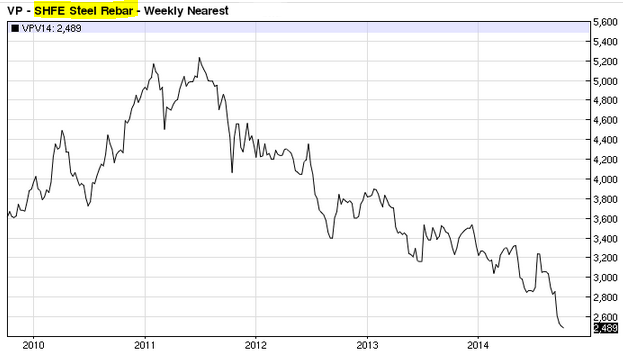Over the years China’s local governments have become dependent on financing themselves via land sales and more recently the so-called Local Government Financing Vehicles (LGFV). Times were good, as property developers grew wealthy via sales of new urban housing while enriching local governments and often government officials. But over the past three years growth in the nation’s property markets has cooled. This slowdown is clearly visible in the decline of prices for steel rebar which is primarily used in construction. This slowdown has accelerated this year.
    |
| Source: barchart |
At the same time Beijing started scrutinizing the banking system (including state-owned banks) where the volume of bad loans had been on the rise. Moreover, many of the earlier infrastructure projects initiated as part of the 2008 stimulus have not yielded the revenue levels that were originally projected. With slower land sales, more stringent bank lending, and a taste for credit, China’s local governments increased their borrowing via LGFV as well as other non-traditional sources (see chart).
    |
| Source: Scotiabank |
This borrowing by municipalities, combined with growing corporate debt (a great deal of it from developers), resulted in China’s total debt-to-GDP ratio increase of over 70% since 2008. Worried about local governments’ growing large-scale credit bubble, Beijing  has recently decided to put an end to these forms of financing. Here is a comment from Beijing’s mouthpiece, the People’s Daily:
People’s Daily: – Funding sources for local governments will change dramatically. Shadow banks and corporate bonds are out: local government bonds are in, for both existing and new debt. This will immediately cure the maturity mismatch risk for local government debt, as local government debt has a longer maturity. The interest burden will also be reduced: Yields on municipal bonds are close to treasury yields and much lower than bank lending rates or trust yields. In the long run, this could strengthen market discipline for local government borrowing, as municipal bonds tend to have stricter requirements on disclosure of fiscal balance sheets and monitoring than shadow banks.

